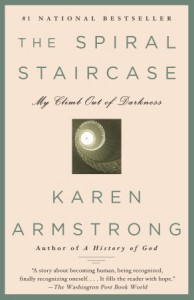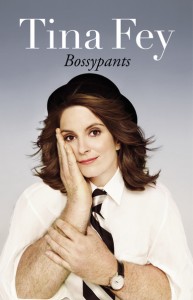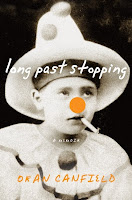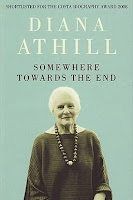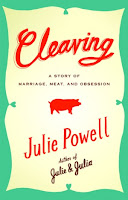 Yes, I am skipping #28, Malcolm Gladwell’s Blink, because I’m not particularly inclined to write and entire post about it. It was interesting, as everything he writes is, but not really book-length fascinating. And I certainly didn’t find it as impactful as The Tipping Point. In a way, the book seemed a bit contradictory — the thesis was all about trusting your first instincts, but the arguments and/or examples were all people who had massive amounts of experience in a particular area that gave them the freedom to trust their first impressions (if that makes any sense). I mean, I realize it’s also about unpacking prejudice and other social innuendos (I found the section on marriage and reading faces particularly interesting), but overall, I don’t know if this book changed my perspective on, well, life and business etc. the way his first book did. Regardless, I am now going to put Outliers on my library holds list because I do like his writing so very much.
Yes, I am skipping #28, Malcolm Gladwell’s Blink, because I’m not particularly inclined to write and entire post about it. It was interesting, as everything he writes is, but not really book-length fascinating. And I certainly didn’t find it as impactful as The Tipping Point. In a way, the book seemed a bit contradictory — the thesis was all about trusting your first instincts, but the arguments and/or examples were all people who had massive amounts of experience in a particular area that gave them the freedom to trust their first impressions (if that makes any sense). I mean, I realize it’s also about unpacking prejudice and other social innuendos (I found the section on marriage and reading faces particularly interesting), but overall, I don’t know if this book changed my perspective on, well, life and business etc. the way his first book did. Regardless, I am now going to put Outliers on my library holds list because I do like his writing so very much.
So, Blink is my trailer — now for the feature, Julie Powell’s Cleaving. I read and adored Julie & Julia, and came to this book with the same wide-eyed wonder of yet another deserving blogger becoming a published writer — expanding and solidifying their skills on the written vs. the virtual page. But, not all books can contain the wonder of first books when they are particularly successful, and Cleaving suffers a little from the sophomore slump.
The first half of the book deals specifically with Powell’s apprenticeship with a butcher shop in rural New York. She writes passionate and obviously well-learned passages about her experiences, and I found these sections of the book the most intriguing. They were riveting — bones cracking, wrists aching — and you can immediately tell the passion she feels toward the art of butchery, a profession that few women enter. But where the book falls down are the “life is messy” bits in between. Her marriage, oft-described as ‘like breathing’ or something equally life-sustaining, has, well, lost its oxygen — both she and her husband are having affairs; Julie first, then Eric in retribution, perhaps. And yet, despite hurting each other to the core, they stay together, they love each other, even if, at that moment, it means a lot of anger and trial separations. Powell’s lover, referred to for most of the book as “D,” is passionate, dirty, and a little rough, which is what she needs. In a way, it fulfills some sense of anger (or I’m totally reading into it) and self-destructive behavior that Powell feels deep down.
Yet, the narrative itself, the Julie Powell contained within the book’s story, doesn’t actively analyze her behaviour — sure, she over-“metaphorizes” it (there are only so many meat metaphors one book should contains). She flails around drinking too much, and somewhat laughing off claims of alcoholism, sex addiction (not really but she does participate in SOME dangerous activities in certain parts of the novel), and actively tries to stalk “D” once he tells her he can no longer see or speak to her. In a way, it’s the same obsessive behavior that made her dedication to the Julie & Julia project work, and you can’t fault Powell for her extremely open, balls on the table, writing style. In a way, though, I did wish she came closer to finding out some answers — or at least looking deeper at the roots of the problems.
The constant comparison between her husband, the meat, and her lover grew tiresome, and then she lost me completely in the second half of the book when she leaves Eric (the husband) to take numerous trips to explore meat culture around the world. Not saying that self-discovery is wrong, or that her experiences don’t sound magnificent, but the whole book felt smacked together in a way that didn’t necessarily work from a narrative point of view. The sinews, forgive my own meat metaphor, grew far too thin between the first part and the second.
In a way, it’s impressive that Powell writes so openly and honestly about her experiences. And I’m not even claiming it’s “TMI” as some of the other criticisms I read around the internet claimed — it’s more that there’s a lack of style to the project, the style was there in her first book, this one feels rushed, repetitive and kind of “shock for shock value.” There’s no denying she’s a talented writer of memoirs (memoirist?) but, on the whole, I wanted there to be a central focus, sometimes, that wasn’t Powell, her actions, her feelings, or her explosive.
Not to make a comparison, but I’ve started Elizabeth Gilbert’s Committed (another library book!) and, while I hated Eat, Pray, Love (threw it across the room half-way through “Pray”), I’m rather taken with it so far. Gilbert sets out, upon learning that she’ll have to marry her lover (so he can live in America, with her), whom she promised never to marry (they both had spectacularly awful divorces), to learn everything she can about the institution to see if she can uncover her preconceived notions and move forward. That’s what Cleaving is missing — context — something beyond the vivid descriptions of butchery (which, I’ll repeat, are excellent) that grounds the memoir in something other than Powell’s own heaving emotions.
That said, the package is fantastic — I adore the cover; think the title is brilliant, it brings up all kinds of great word associations; and ripped through the first part in an afternoon. So, I’m on the fence when it comes to the book as a whole, but felt spectacularly sorry for her husband, her lover and Powell herself, the emotional train wreckage they all went through was so messy — it can’t have been easy to relive it on the page. And sometimes, the rawness of it all comes through so clearly that I’m surprised Powell had the gumption not to edit herself, even if the book suffers for it.
I read this great opinion piece on NPR’s MonkeySee blog about the book. And agree, too, with the Globe’s review. In case anyone was thinking of reading this book, too.
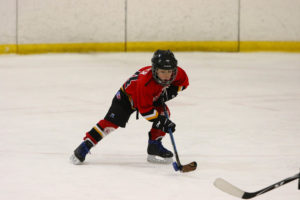 I’m sitting at work, contemplating getting my lunch, and thinking about how to re-start doing something you haven’t done in a long while. How do you re-ignite a relationship that’s fallen fallow? A simple hello?
I’m sitting at work, contemplating getting my lunch, and thinking about how to re-start doing something you haven’t done in a long while. How do you re-ignite a relationship that’s fallen fallow? A simple hello?